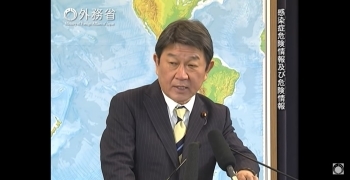Press Conferences
Press Conference by Foreign Minister MOTEGI Toshimitsu
Tuesday, May 18, 2021, 2:36 p.m. Ministry of Foreign Affairs
Japanese
Japan-U.S.-Republic of Korea (ROK) Cooperation
Asahi Shimbun, Sato: There have been some recent reports that a Japan-U.S.-ROK Summit Meeting may be held during the G7 Summit Meeting in June. There have been frequent reports recently on meetings among dignitaries from Japan, the United States, and the ROK, and you attended a Japan-U.S.-ROK Foreign Ministers’ Meeting during your overseas visits during Golden Week. The United States’ review on North Korea has ended, and the significance of Japan-U.S-ROK cooperation has been increasing. Can you tell us again your thoughts on the ideal division of roles between Japan, the United States, and the ROK as well as the significance of Japan-U.S.-ROK cooperation?
Mr. MOTEGI Toshimitsu, Minister for Foreign Affairs: I do not completely understand the meaning of your question. However, I believe that Japan-U.S.-ROK cooperation is extremely important, including for responding to North Korea.
Also, I do not believe that meetings between Japan, the United States, and the ROK have been as frequent as you stated. I believe the Japan-U.S.-ROK Foreign Ministers’ Meeting on May 5 was the first opportunity for such a meeting in a long time. In any event, I believe that affirming cooperation in various forms is important in terms of the regional developments.
Engagement by Europe in the Indo-Pacific Region
Independent Web Journal, Chiura: From May 11-17, 2021, Japan, the United States, Australia, and France conducted the multilateral exercise “ARC21” with participation by the countries’ armies and navies. In addition, the United Kingdom dispatched a carrier strike group (CSG) centered on the Queen Elizabeth aircraft carrier to the Indo-Pacific region, which is scheduled to make a port call in Japan within the year and conduct an exercise with the Japan Self-Defense Forces.
Won’t the solidarity of the so-called Quad as well as various European countries with an interest in the Indo-Pacific region deploying troops lead to the provocation of China and clashes? Do you believe this will lead to the peace and stability of the international community?
In addition, the Government has not issued many explanations or information on this. We would like this to be issued.
Minister Motegi: Firstly, Japan advocated the “Free and Open Indo-Pacific” concept during TICAD6 in 2016. The concept promotes cooperation to create regional peace, stability, and prosperity while sharing common values such as democracy, respect for human rights, and the rule of law. In regard to this, Japan, the United States, Australia, and India have been strengthening their cooperation and connectivity, and recently this has been spreading in various fields including provision of vaccines to Asia-Pacific island countries.
In addition, ASEAN, which is in a strategic location in the Indo-Pacific region, has issued its ASEAN Outlook on the Indo-Pacific (AOIP), which has many basic similarities with the “Free and Open Indo-Pacific” concept. Such matters were affirmed at the Japan-ASEAN Summit Meeting last year and we decided to promote cooperation.
From the beginning of this year, I attended the EU Foreign Affairs Council in January. I explained the “Free and Open Indo-Pacific” concept, and many countries stated that they wanted to support and cooperate in the concept.
This was in terms of security, but there has also been progress in various other fields as well. It is certainly true that various countries, including France, Germany, and the Netherlands, have issued policy documents on the Indo-Pacific. The Government of the United Kingdom has also set forth its policy on the “Indo-Pacific tilt.”
This is in terms of general policy. Amidst this, as you pointed out, various efforts are being made such as the United Kingdom dispatching a CSG, Germany dispatching a frigate, and multilateral exercises. The “Free and Open Indo-Pacific” has been an inclusive concept for all countries from the start. The concept is open to countries that precisely share such ideas and adhere to the rules, and this has been carefully explained. I believe you have heard this explanation countless times, so it is not at all the case that the explanations have been insufficient.
Developments in Israel and Palestine
Pan Orient News, Azhari: I would like to ask about the situation in Gaza which is escalating. The Human Rights Watch shared a report last month. It said that Israel’s policy toward the Palestinians meet the definition of apartheid and prosecution, and thus considered crimes against humanity. In this regard, what is Japan’s position on this situation?
Minister Motegi: I believe it is necessary to view this issue from both sides. The situation in Israel and Palestine is worsening by the day due to the clashes and violence in the West Bank area including Eastern Jerusalem, with attacks by Palestinian insurgents such as rocket launches from the Gaza Strip, and the counterattacks by the Israeli military such as surface attacks. It is extremely deplorable that many casualties have occurred among civilians on both sides. Japan strongly condemns all such acts of violence.
We are convinced that the issues of the parties concerned in Israel and Palestine absolutely cannot be solved through violence, but only through negotiations and efforts to build mutual trust between the parties. We are urging Israel and Palestine to exert maximum self-restraint.
The United States, Egypt, and others are currently conducting intermediary efforts. President Biden is also actively urging the countries, including expressing his support for a ceasefire to Prime Minister Netanyahu. Japan will support such efforts. We will continue to conduct diplomatic efforts in cooperation with the international community toward the winding down of the situation while carefully observing such developments.


